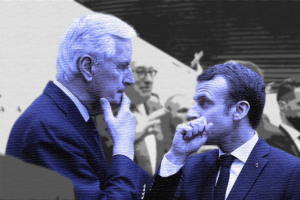The Downfall of the Abbé Pierre
A sex scandal involving its most admired celebrity is shaking France to its core. French priest Abbé Pierre prepares to drive away after making various speeches to volunteer helpers who help the homeless in the streets of Paris, on Feb. 2, 1954. (AP Photo)
French priest Abbé Pierre prepares to drive away after making various speeches to volunteer helpers who help the homeless in the streets of Paris, on Feb. 2, 1954. (AP Photo)
All around France, portraits of the country’s most famous man are being taken down. Statues are being removed and the streets and squares are being reconsidered, one by one. On Sept. 17, the Socialist mayor of Paris, Anne Hidalgo, announced that a well-known park would be renamed.
Henri Grouès was a Capuchin monk and super-celebrity known by his wartime resistance name of Abbé Pierre. He held the title of France’s “most famous person” from 1953 to 2003, the year he was overtaken by the soccer star Zinedine Zidane. Long considered the acme of selfless morality, his storied church career — it was revealed in July — was based from the beginning on sex. The closest U.S. parallel might be Bill Cosby, but Grouès wasn’t an entertainer. He was a social reformer and activist with an impact on French society that resists comparison.
Until the revelations came to light, his life story was believed to be perfect. After joining the church as a teenager, he helped French Jews to escape to Switzerland during the Second World War. After escaping a Nazi prison, he joined the Free French forces in Algeria. After the war, he was awarded the Croix de Guerre and the Medal of the Resistance, and took a place in the National Assembly representing a Christian-Democrat party. Already a national figure as a young man, in 1953 he found the calling that would define him. That winter was very hard, and homeless people were freezing to death in the streets. He had already become a radio personality by entering a game show to raise money for the homeless, so this time he went on the radio directly seeking relief for this specific group. The response from the public was huge. The appeal raised 500 million francs (about 12.5 million 2024 dollars). It turned out that this smiling and famous monk was the perfect fundraiser. A French Jerry Lewis.
Until the revelations came to light, his life story was believed to be perfect.
But he didn’t just hand the money over to someone else. In 1949, he founded an organization called Emmaus, which operates internationally but has become part of the fabric of life in France. Operated by the Abbé Pierre Foundation, it is a network of centers run where homeless people, including people without papers, live in a managed community with some paid staff and volunteers, but nearly everything done by the residents themselves. People donate books, furniture, clothes, household appliances and electronics, bicycles — they do house clearances, too — and three afternoons a week the center opens its doors to the public. First on the scene are antique dealers, hunting for something to resell, but a whole cross-section of French society comes to Emmaus in search of something specific or just to browse. The prices are very cheap, and after years on the streets, lost in drugs or alcohol or mental illness, the residents can interact with society in this safe, friendly environment. It all works perfectly.
For decades his iconic portrait — clerical dog-collar, beard, glasses, beret — was everywhere. When he died in 2007, his funeral was a national event, with two presidents in attendance, and he was lauded as a kind of saint. Not an actual saint, though. He spoke out on various issues that went against church doctrine, and it is a very modern list. He thought clergy should be allowed to marry and supported the ordination of women. He supported the use of contraceptives, and thought gay couples should be allowed to adopt children. In international human rights work, he advocated for refugees, including Palestinians, and spoke against apartheid.
The Abbé Pierre Foundation itself will change its name, though they haven’t decided on a new one yet, and they have made a stark statement recasting this longtime hero as a criminal and a pervert.
It now turns out that complaints about his unwanted approaches to women started in the 1950s, and his superiors in the church knew about them but chose to do nothing. As his transgressive behavior escalated, progressing to assault and even rape, the bishops and archbishops looked the other way. He was not only the most famous person in France: He was the most trusted person, too. This raises the depressing question: If you can’t trust the Abbé Pierre, who can you trust?
The full story that has come to light begins with the teenage Henri Grouès having a gay affair with another boy. Consumed with guilt about this — homosexuality being illegal in France at that time — he joined his monastic order at age 17. If his aim was to suppress his homosexuality, joining the Capuchin Order seems to have worked, but only in the sense that the dozens of complaints and testimonies now seeing the light (the story broke in July, but every day sees some fresh accusation or detail) all involve his approaches to girls and women.
He traveled widely once his foundation had started to work, and a retired Swiss prostitute has said that he was a regular visitor to the brothel where she worked.
It now turns out that complaints about his unwanted approaches to women started in the 1950s, and his superiors in the church knew about them but chose to do nothing.
This in itself might be survivable — visiting brothels is not illegal — but the latest wave of accusations also involve rape and nonconsensual sexual encounters of various kinds, including some accusations involving underage girls. This is not survivable, and the familiar Emmaus vans that go around picking up donations, many of them bearing his image, are being stoned and vilified in the streets with cries of ‘rapist’ and ‘pedophile.’
The former president, François Hollande, caught the mood of many older people on TV, trying to find some way to remember all the good things that Abbé Pierre did around the world; but it is clearly too late. Church authorities at various levels have to explain why decades of complaints from women — many reporting relatively minor actions like unwanted kisses — somehow got lost in the files for decades, and the question has now reached the top man. On Sept. 13, Pope Francis answered a question about the Abbé Pierre by saying that yes, the Vatican had known about the accusations, but that he personally had not been around, and that he couldn’t tell whether the Vatican knew while he was still alive, or only after his death.
French Catholic organizations are biting the bullet and taking the lead in bringing these stories out. After all, it is church authorities who have been covering it all up. But the Vatican has been largely quiet.
“The Pope is an idiot,” said François Devaux, cofounder of La Parole Libérée, a nonprofit representing the adult victims of child abuse by priests, and himself such a victim. “’If the church wasn’t still afraid, they wouldn’t just be opening the files about the Abbe Pierre, they’d be opening the files about the thousands of other predators active within the Church.”
Your support matters…Independent journalism is under threat and overshadowed by heavily funded mainstream media.
You can help level the playing field. Become a member.
Your tax-deductible contribution keeps us digging beneath the headlines to give you thought-provoking, investigative reporting and analysis that unearths what's really happening- without compromise.
Give today to support our courageous, independent journalists.




You need to be a supporter to comment.
There are currently no responses to this article.
Be the first to respond.